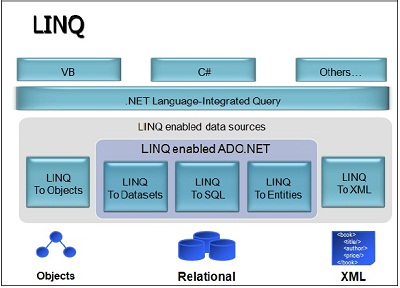Advertisement
LINQ | Advantages Of LINQ | Why .net Developers prefer LINQ
What is LINQ :
LINQ stands for “Language Integrated Query” .
LINQ is one of the components of Microsoft’s .NET Framework that provides technique for querying data that supports not only database but XML and many other data sources.
This feature was introduced in VISUAL STUDIO 2008 which extending the powerful capabilities of querying with C# and Visual Basic and is compiled under .NET environment.
LINQ eliminates the issues generally occurred between database and different programming languages and thus provides a querying interface for different types of data stores.
Flavors of LINQ :
Currently Microsoft provides below flavors of LINQ :
- LINQ to Objects
- LINQ to Databases
- LINQ to SQL
- LINQ to Entities
- LINQ to XML
Advantages of LINQ :
- LINQ provides standardized way of querying against multiple data sources.
- As LINQ is one component .NET framework, it provides IntelliSense and syntax highlighting and faster than the writing old style queries.
- With LINQ you can easily debug queries.
- LINQ is type safe so errors in queries can be checked while compile time.
- LINQ provides easy deployment as everything is compiled into the single DLL.
- LINQ is extensible.
- LINQ is transformative i.e. results of one data source can be transformed into another format in LINQ query.

